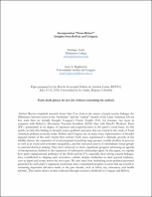JavaScript is disabled for your browser. Some features of this site may not work without it.
Incorporation “from below”: insights from Bolivia and Uruguay
Fecha
2018Autor
Anria, Santiago
Bogliaccini, Juan Ariel
Metadatos
Mostrar el registro completo del ítemResumen
Recent empirical research shows that if we look at the nature of party-society linkages the differences between cases in the “moderate” and the “radical” strands of the Latin American left are less stark than we initially thought. Uruguay’s Frente Amplio (FA), for instance, has more in common with Bolivia’s Movement Towards Socialism (MAS) than with Brazil’s Workers’ Party (PT)—particularly in its degree of openness and responsiveness to the party’s social bases. In this article, we link this finding to broader macro political outcomes that are central in the study of Latin American political economy today. Bolivia and Uruguay are, in many ways, representative of broader regional trends of the early twenty-first century: both cases experienced a dramatic growth of the middle classes, the expansion of social programs benefiting large groups, notable declines in poverty as well as in social and economic inequalities, and the increased access of subordinate social groups to national decision-making. They have achieved, in short, significant progress advancing an agenda of incorporation, defined as the expansion of substantive citizenship rights. In this paper, we explain how party organizational attributes of the MAS and the FA, especially their strong societal linkages, have contributed to shaping such outcomes—which, despite similarities in their general tendency,
vary in depth and scope across the two cases. We also trace how underlying socio-political pressures generated by each party’s organized social bases have constrained progress in areas that are crucial to sustaining important advances made in the past decade, such as labor, tax, education, and health reforms. This article draws on data collected through extensive fieldwork in Uruguay and Bolivia.
Colecciones
- Artículos [51]


